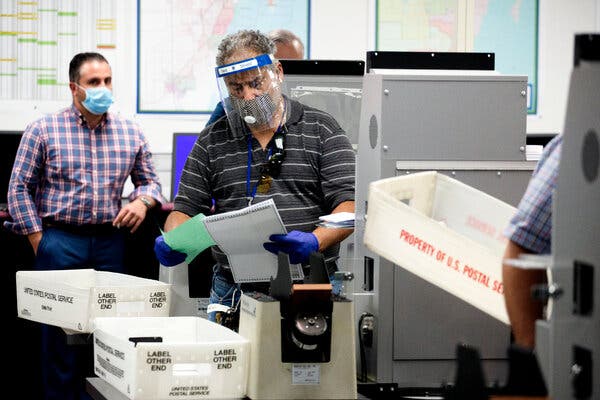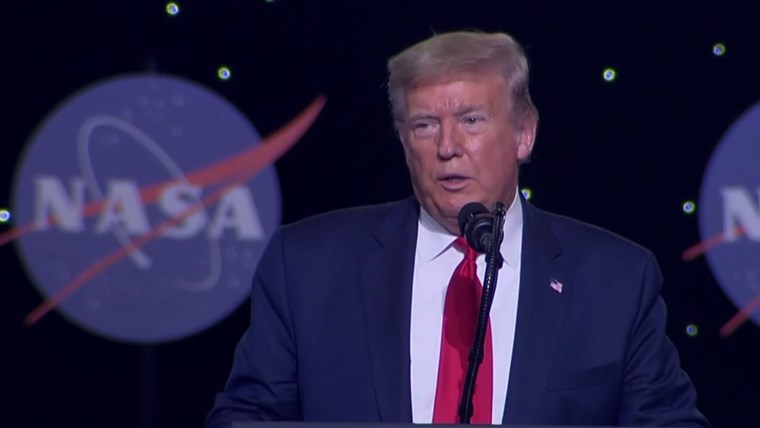Advertisement

WASHINGTON — The Republican Parties in Arizona, Kansas, Nevada and South Carolina intend to cancel the 2020 presidential primaries in their states, according to three people familiar with their plans, a move aimed at depriving President Trump’s long-shot challengers of chances to build support.
The state parties have not formalized their decisions, but Mr. Trump’s challengers denounced the move. Joe Walsh, a former Tea Party congressman from Illinois who announced his candidacy last month, said he planned to fight the move legally and by appealing directly to voters in those states.
“It’s something a mob boss would do,” Mr. Walsh said in an interview. “All the times in 2016 when he said the Democrats were rigging the system to elect Hillary? He is actually eliminating elections in certain states, and that’s undemocratic.”
William F. Weld, a former governor of Massachusetts who is also challenging Mr. Trump for the party’s nomination, said he found the move concerning but not surprising.
“Mr. Trump has not been bashful about his desire to avoid primaries or even elections,” Mr. Weld said. “He spoke admiringly of Xi Jinping getting rid of elections and talks about a third term for himself, which he has to know is not lawful. This is something that would be appropriate in a monarchy.”
Other states could follow suit before the Oct. 1 deadline for state parties to file delegate selection plans with the Republican National Committee, campaign officials said. States that do not hold primaries still choose delegates, often by holding a convention. The plans to cancel primaries were first reported on Friday by Politico.
The Trump campaign said there was nothing unusual about a move that was intended to help state parties save money on costly primary elections.
“These are decisions made entirely by state parties, and there are volumes of historical precedents to support them,” said Tim Murtaugh, a Trump campaign spokesman. “Nevertheless, President Trump will dominate and prevail in whatever contest is placed before him.”
Despite the outcry from Republican challengers who so far have gained little traction within a party in which Mr. Trump’s approval rating is consistently in the high 80s, blocking presidential primaries in some states is not unusual when an incumbent is running for re-election, officials said.
The Trump campaign pointed out that in 1992, when President George Bush was seeking re-election, Republicans canceled primaries in eight states, and in 2004, when President George W. Bush was running again, they canceled 10.
The campaign also pointed out that in 1996, when President Bill Clinton was running for a second term, Democrats canceled primaries in eight states, and in 2012, when President Barack Obama was running, they canceled 10.
“Whether or not to hold a presidential primary is a decision made by our state executive committee every four years,” said Drew McKissick, the chairman of the South Carolina Republican Party. “There is strong precedent on the part of both parties to not hold a primary when they control the White House.”
Mr. Weld acknowledged the precedent but said the Trump campaign was taking it a step further.
“This year, the Trump people tried to cancel the first-in-the-nation primary in New Hampshire,” he said. “They did not succeed, but it shows you the lengths it will go to.”
But with the potential for more Republicans to enter the race — Mark Sanford, former governor and congressman from South Carolina, has been toying with a run — political strategists said there was also a case for the White House to confront the challengers head-on.
“Our policy in the past has always been, you’re an incumbent president, you have certain advantages and you’ll probably be nominated again, but go out and win it,” said Ed Rollins, the national campaign director for President Ronald Reagan’s 1984 re-election effort.
For a year, Mr. Trump’s advisers have made moves to block any challenger from gaining traction, saying that incumbents who have faced debilitating primaries have gone on to lose in the general election, as President Jimmy Carter did in 1980 after a strong challenge from Senator Edward M. Kennedy.
David Axelrod, who was President Barack Obama’s chief strategist in the 2012 re-election campaign, said that “obviously, any incumbent president works to forestall a primary challenge.”
“But cancellation of them?” he added, “I don’t remember that being fundamental to our strategy. And I’m not sure that it bespeaks a great deal of confidence.”
A version of this article appears in print on , Section A, Page 17 of the New York edition with the headline: G.O.P. in Four States May Cancel Primaries, a Blow to Trump Challengers. Order Reprints | Today’s Paper | Subscribe

